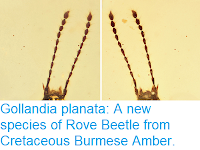Skin Beetles, Dermestidae, are small (1-12 mm) oval Beetles with scaly
bodies and distinctive clubbed antennae which can be fitted into grooves
on the body for protection. Most species feed on dry plant matter, and
can be a pest if they get into grain stores or fabrics. Others are
carrion feeders, and are considered useful in forensic entomology; they
are late stage carcass feeders targeting dried skin, tendons and bone,
and their presence indicates how long corpses have been exposed (rather
than buried or shoved in a fridge) after their deaths, not generally
colonising a body till it has been dead about five days. They are also
sometimes used by natural history museums to clean animal skeletons for
display. There are currently between 500 and 700 described species of Skin Beetle, with 266 placed in a single genus, Anthrenus, which has a global distribution, even being found on many small oceanic islands.
In a paper published in the Turkish Journal of Zoology on 28 November 2018, Jiří Háva of the Department of Forest Protection and Entomology at the Czech University of Life Sciences, Aijaz Ahmad Wachkoo of the Department of Zoology at the Government Degree College in Shopian, and Amir Maqbool of the Department of Zoology at the Government College for Women in Srinagar, describe a new species of Anthrenus from the Kashmir Valley in Jammu and Kashmir State, India.
The new species is named Anthrenus himalayensis, in reference to the Himalayas Mountains, where it was found. These Beetles are about 2.8 mm in length and about 1.7 mm in width, brown, yellow and white in colour and covered in fine scales. The sexes can be told apart by their antennae. They were found visiting the flowers of the Large Leaflet Water Parsnip, Sium latijugum, in November 2017, at an altitude of 2146 m above sealevel.
Anthrenus himalayensis: (4) Lateral view; (5) Dorsal view. Háva et al. (2018).
See also...
Follow Sciency Thoughts on Facebook.







